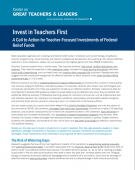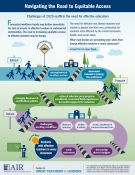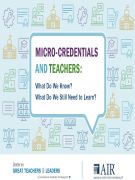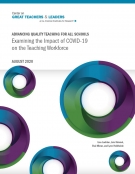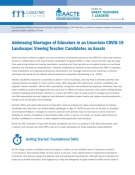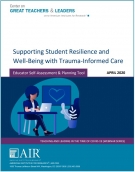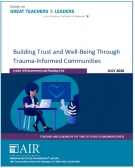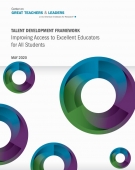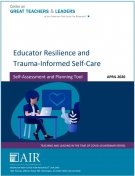The best way to invest in students is to invest in teachers first. We urge education leaders to make significant, strategic investments in educators to stabilize the educator workforce and address... Read more »
Featured Publications
|
|
|
Explore strategies to adapt educator evaluation and support system policies and practices to support virtual learning. |
|
What road bumps are preventing your state from having effective teachers in every classroom? |
|
Ground your state's micro-credential implementation efforts in emerging best practices and explore our forward-looking research agenda. |
|
Consider the short-term and long-term implications that COVID-19 will have on the educator workforce and explore guiding principles for addressing the challenges.
|
|
Explore guidance on how to ensure career changes recruited into the teaching profession are selected based on their potential to succeed. |
|
Discover concrete ways teacher candidates can be leveraged to better support veteran teachers during the shift to distance learning, or new education models as schools reopen.
|
|
Discover ways of supporting student well-being that includes an array of trauma-informed strategies for fostering student well-being and resilience during these unprecedented times. |
|
District and school leaders can use this tool to select trauma-informed strategies to foster trust, well-being, and resilience in their unique contexts. |
|
Explore potential funding that can be leveraged by states, districts, and educator preparation providers to address talent development across the full educator career continuum. |
|
Proactively and purposefully address educator shortages and talent challenges in your local context. |
|
Use this self-care self-assessment to select key strategies for fostering resilience and identify areas of strength and growth related to self-care and developing self-care plans. |
|
Support teacher wellness under COVID-19 by understanding teacher stress levels in various contexts. |
|
Discover concrete ways to modify teacher quality programs, such as mentoring and induction programs, to succeed in high-need contexts. |
|
Explore 10 strategies to address 10 common challenges that rural schools face when implementing mentoring and induction programs. |
|
Explore four key decision points states should consider in measuring equitable access to effective educators. |
Other Publications
This Chiefs for Change brief highlights the Tennessee Department of Education (TDOE)’s efforts to engage teachers as leaders, often through roles such as instructional, curriculum, or content area... Read more »
This brief by the Center for American Progress highlights how some states use funding through Title II, Part A of the Every Student Succeeds Act (ESSA) to strengthen the teacher pipeline by... Read more »
Explore the GTL Center’s practical vision for designing talent systems that meet the challenges of today.
A TQ Center Research-to-Practice Brief, this resource describes options for states to change fragmented professional development into more coherent and sustained professional learning... Read more »
This guide from the National School Boards Association and the Center for Public Education offers a wealth of information on teacher evaluation policies in every state, which have changed... Read more »
Learn how states are creating equivalency or approval processes for district evaluation systems.

